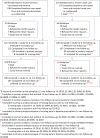Effect of a Primary Care Management Intervention on Mental Health-Related Quality of Life Among Survivors of Sepsis: A Randomized Clinical Trial
- PMID: 27367877
- PMCID: PMC5122319
- DOI: 10.1001/jama.2016.7207
Effect of a Primary Care Management Intervention on Mental Health-Related Quality of Life Among Survivors of Sepsis: A Randomized Clinical Trial
Abstract
Importance: Survivors of sepsis face long-term sequelae that diminish health-related quality of life and result in increased care needs in the primary care setting, such as medication, physiotherapy, or mental health care.
Objective: To examine if a primary care-based intervention improves mental health-related quality of life.
Design, setting, and participants: Randomized clinical trial conducted between February 2011 and December 2014, enrolling 291 patients 18 years or older who survived sepsis (including septic shock), recruited from 9 intensive care units (ICUs) across Germany.
Interventions: Participants were randomized to usual care (n = 143) or to a 12-month intervention (n = 148). Usual care was provided by their primary care physician (PCP) and included periodic contacts, referrals to specialists, and prescription of medication, other treatment, or both. The intervention additionally included PCP and patient training, case management provided by trained nurses, and clinical decision support for PCPs by consulting physicians.
Main outcomes and measures: The primary outcome was change in mental health-related quality of life between ICU discharge and 6 months after ICU discharge using the Mental Component Summary (MCS) of the 36-Item Short-Form Health Survey (SF-36 [range, 0-100; higher ratings indicate lower impairment; minimal clinically important difference, 5 score points]).
Results: The mean age of the 291 patients was 61.6 years (SD, 14.4); 66.2% (n = 192) were men, and 84.4% (n = 244) required mechanical ventilation during their ICU stay (median duration of ventilation, 12 days [range, 0-134]). At 6 and 12 months after ICU discharge, 75.3% (n = 219 [112 intervention, 107 control]) and 69.4% (n = 202 [107 intervention, 95 control]), respectively, completed follow-up. Overall mortality was 13.7% at 6 months (40 deaths [21 intervention, 19 control]) and 18.2% at 12 months (53 deaths [27 intervention, 26 control]). Among patients in the intervention group, 104 (70.3%) received the intervention at high levels of integrity. There was no significant difference in change of mean MCS scores (intervention group mean at baseline, 49.1; at 6 months, 52.9; change, 3.79 score points [95% CI, 1.05 to 6.54] vs control group mean at baseline, 49.3; at 6 months, 51.0; change, 1.64 score points [95% CI, -1.22 to 4.51]; mean treatment effect, 2.15 [95% CI, -1.79 to 6.09]; P = .28).
Conclusions and relevance: Among survivors of sepsis and septic shock, the use of a primary care-focused team-based intervention, compared with usual care, did not improve mental health-related quality of life 6 months after ICU discharge. Further research is needed to determine if modified approaches to primary care management may be more effective.
Trial registration: isrctn.org Identifier: ISRCTN61744782.
Figures
Comment in
-
The Challenging Task of Improving the Recovery of ICU Survivors.JAMA. 2016 Jun 28;315(24):2671-2. doi: 10.1001/jama.2016.7211. JAMA. 2016. PMID: 27367765 No abstract available.
-
Dealing with the critical care aftermath: where to from here?J Thorac Dis. 2016 Sep;8(9):2400-2402. doi: 10.21037/jtd.2016.08.86. J Thorac Dis. 2016. PMID: 27746987 Free PMC article. No abstract available.
-
From self-awareness to self-actualization: empowering sepsis survivors to a meaningful and enduring recovery.J Thorac Dis. 2016 Oct;8(10):E1238-E1241. doi: 10.21037/jtd.2016.10.38. J Thorac Dis. 2016. PMID: 27867597 Free PMC article. No abstract available.
References
-
- Angus DC, van der Poll T. Severe sepsis and septic shock. N Engl J Med. 2013;369(21):2063. - PubMed
-
- Hall MJ, Williams SN, DeFrances CJ, Golosinskiy A. Inpatient care for septicemia or sepsis: a challenge for patients and hospitals. NCHS data brief. 2011(62):1–8. - PubMed
-
- Iwashyna TJ, Angus DC. Declining case fatality rates for severe sepsis: good data bring good news with ambiguous implications. JAMA. 2014;311(13):1295–1297. - PubMed
-
- Kaukonen KM, Bailey M, Suzuki S, Pilcher D, Bellomo R. Mortality related to severe sepsis and septic shock among critically ill patients in Australia and New Zealand, 2000-2012. JAMA. 2014;311(13):1308–1316. - PubMed
Publication types
MeSH terms
Associated data
Grants and funding
LinkOut - more resources
Full Text Sources
Other Literature Sources
Medical


